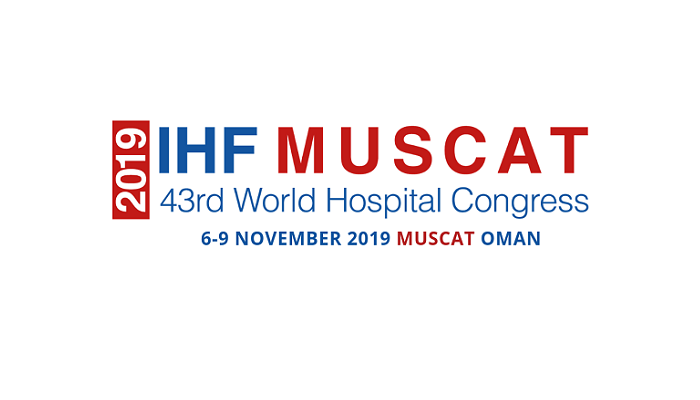Hosted by the Ministry of Health of the Sultanate of Oman, the 43rd World Hospital Congress of the International Hospital Federation (IHF) will go over some of the most pressing subjects in the global healthcare community in over 40 sessions lined up for discussion on 6 to 9 November in Muscat.
In between times of peace, situations of humanitarian crisis always manage to creep in or sweep off the guards of healthcare systems and even governments. Epidemics, wars and terrorist attacks, natural disasters and man-made hazards, and major cases of poverty and famine often fall on the ground wrecking communities’ health defenses. The persistence of these phenomena and their prevailing nature demand collective attention and actionable long-lasting mitigation plans, which are best formulated with resilient health services, health investments for prosperity, and innovations for health impact.
Under an overarching theme “People at the heart of health services in peace and crisis”, the agenda of the World Hospital Congress will cover the stages of preparation while in peace, action when in crisis and moving forward to better healthcare services for communities.
The World Health Organization (WHO) will be hosting an opening keynote session on the role of hospitals in support of universal health coverage to be presented by Dr. Edward Kelley, Director of the Department of Integrated Health Services of WHO. It will be followed by a ministerial-level panel discussion to further explore how hospitals are integral to the UHC and PHC agenda and how they can contribute to transforming health systems.
In another keynote presentation, Dr. Akihiro Seita, Director of Health Programme of UNRWA (UN Relief and Works Agency for Palestine refugees in the Near East) will share about the challenge of UNRWA in providing Palestine refugees access to hospital services. In succeeding sessions, stories and perspectives taken right from the terrorist attacks in Kenya and the continuing displacement and refugee casualties in Afghanistan are ready to open many eyes to the bigger fights of the healthcare community against massive violence.
A number of sessions are equally dedicated to reviewing the central role of hospitals in the health system. In a keynote session, Dr. Agnes Soucat, Director of Health Systems Governance and Financing at WHO will help delegates further understand the role of hospitals and health services affecting population well-being. Likewise, Dr. Melinda Estes, President and Chief Executive Officer of the Saint Luke’s Health System in USA will share her knowledge about how hospitals and health systems can drive community health and prosperity.
Inspiring accounts about the birth of the Oman Cancer Association, an Omani community built from the sentiments of a cancer survivor now collaborating with several programs supportive of cancer patients, will also be told by Hon. Yuthar Mohammed Al Rawahy, Founder and Honorary Life President of the Oman Cancer Association. More sessions from this year’s congress host – the Ministry of Health of the Sultanate of Oman – will share about Oman’s stories of resilience, the integrated healthcare system they have established, as well as e-health innovations and achievements.
Innovation pathways will also take the floor in a keynote presentation to be delivered by Sir Andrew Dillon CBE, Chief Executive of the National Institute for Health and Care Excellence in UK. More topics on health innovations will be tackled in detail through the inspiring digital transformation experience of Catalonia and the huge success of Taiwan’s healthcare IT transformation.
GS1 Healthcare has also arranged a session to share examples from several countries of enhanced healthcare results by the introduction of global standards, starting at procurement in healthcare organizations.
The concept of ‘anchor institutions’ will be elaborated by senior health service leaders and experts from the NHS Confederation.
Composed of several more currently relevant topics, the agenda of the Congress will once again serve eye-opener stories happening around the globe posting both serious challenges and ripe potentials to innovate and invest on people-centered health services whether in peace or in crisis.
The IHF Muscat World Hospital Congress will take place through four consecutive days of knowledge harvest including pre-Congress sessions on ‘Economics for Healthcare Leaders’ and ‘The “Fast Forward” Initiative for community- and person-centered hospitals and health services’. This annual event will close with a hospital tour to The Royal Hospital and the Sultan Qaboos University Hospital. Visit the Congress website to view the entire agenda and the list of speakers: https://worldhospitalcongress.org/
About World Hospital Congress
The World Hospital Congress of the International Hospital Federation (IHF) is a unique global forum that brings together leaders of national and international hospital and healthcare organizations to discuss key drivers of national and international policy, management, financial trends and solutions in healthcare management and service delivery. Through this forum multidisciplinary exchange of knowledge, expertise and experiences are facilitated, together with dialogue on best practices in leadership in hospital and healthcare management and delivery of services. The IHF World Hospital Congress is a one-stop shop for the healthcare professional seeking the opportunity and environment in which to engage in a 360-degree learning and knowledge-sharing experience among peers.
About the International Hospital Federation (IHF) Established in 1929, the IHF is an international not for profit, non-governmental membership organization. Its members are worldwide hospitals and healthcare organizations having a distinct relationship with the provision of healthcare. The IHF provides its members with a platform for the exchange of knowledge and strategic experience as well as opportunities for international collaborations with different actors in the health sector. IHF recognizes the essential role of hospitals and health care organizations in providing health care, supporting health services and offering education. Its role is to help international hospitals work towards improving the level of the services they deliver to the population with the primary goal of improving the health of society. www.ihf-fih.org


















